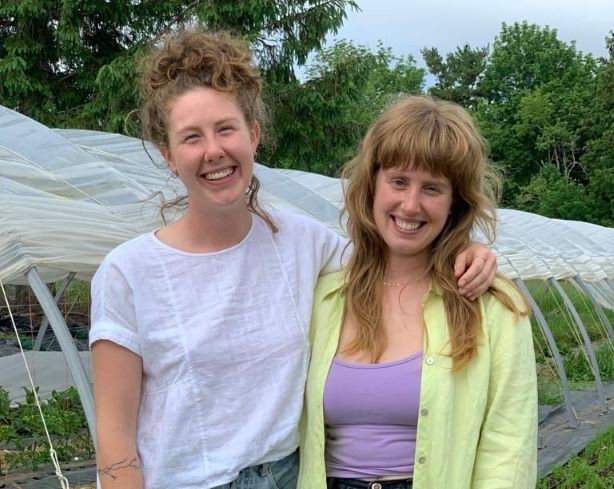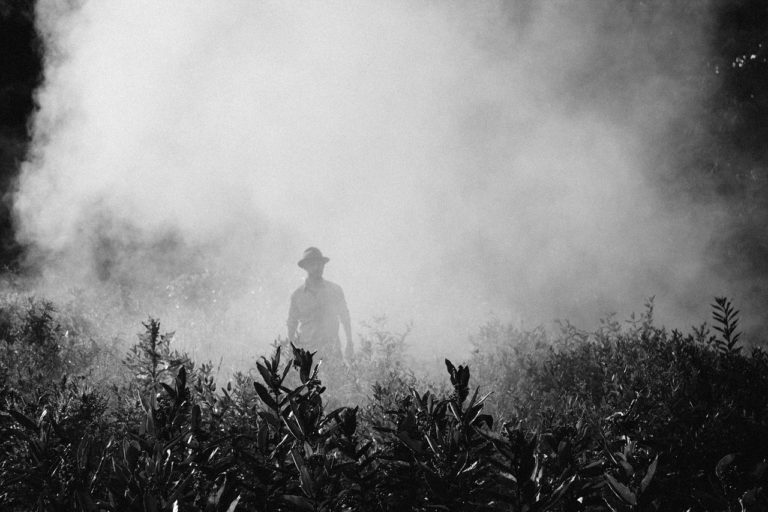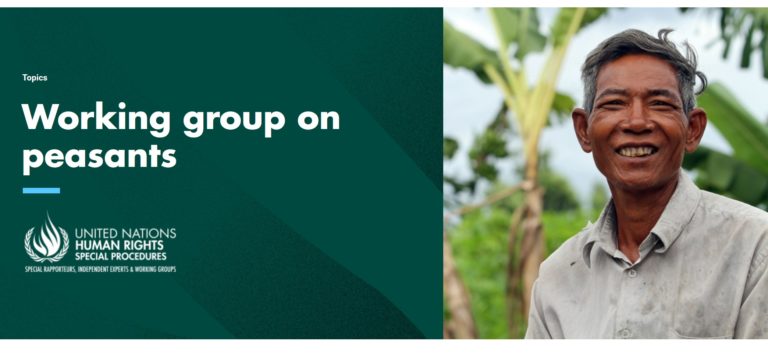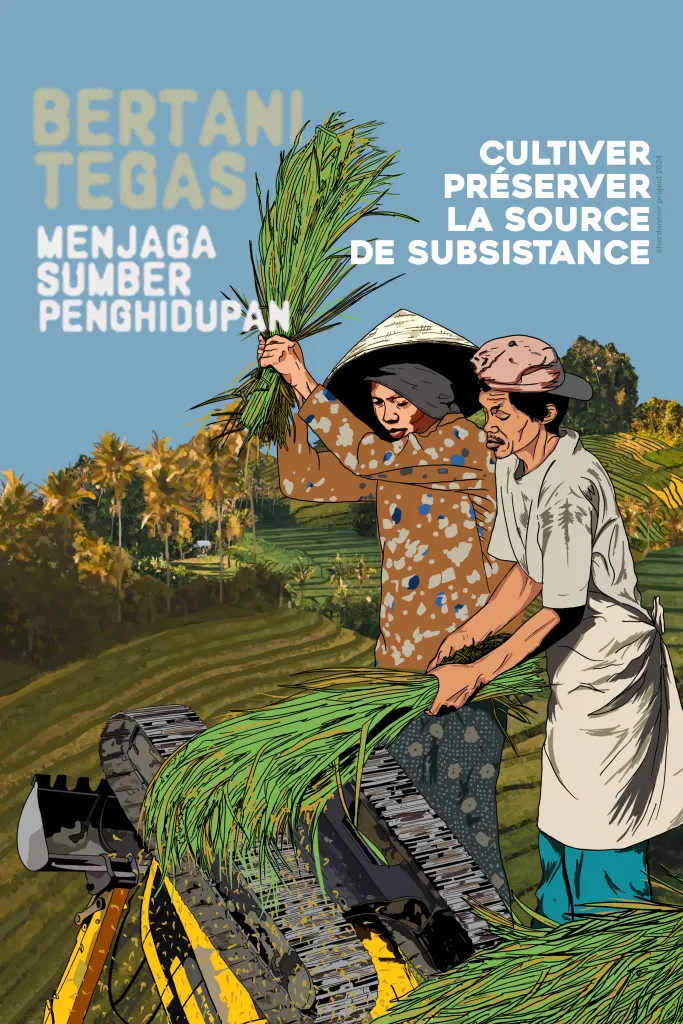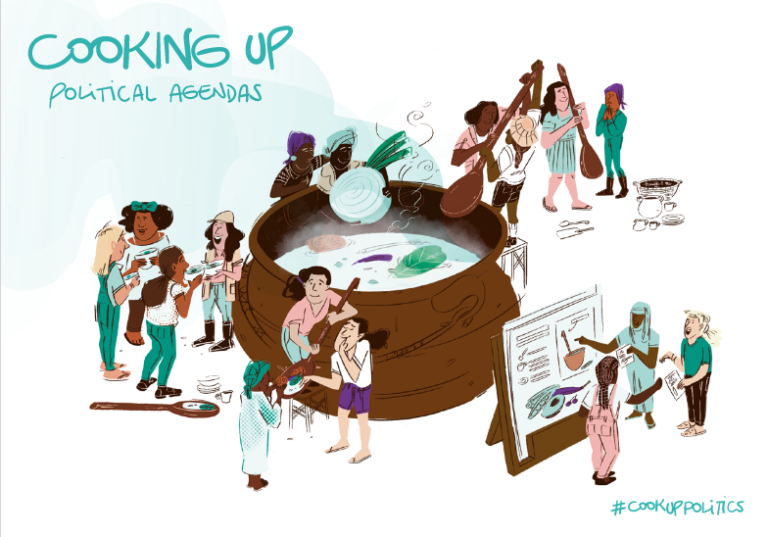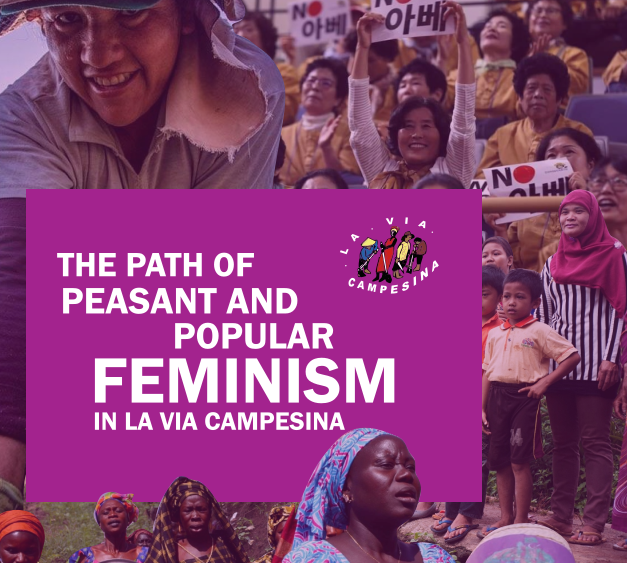Interview of Jessie MacInnis, small-scale farmer in Canada and Peasants’ rights activist
Jessie MacInnis is a small-scale farmer from Canada. She farms in Nova Scotia (also known as Mi’kma’ki, the unceded land of the Mi’kmaq) with her sister where they grow vegetables and flowers. She is Youth President of the National Farmers Union, which is a member organisation of La Via Campesina. Jessie is a member of the Peasants Rights Collective of La Via Campesina and the did her Master’s research on the United Nations Declaration on the Rights of Peasants and Other People Working in Rural Areas (UNDROP), which culminated in the paper The Potential of UN Declaration on the Rights of Peasants and Other People Working in Rural Areas: Moving towards rights-based agriculture policy in Canada (2021). She is currently doing a PhD in Geography on Food Sovereignty and Youth.
When the UNDROP was adopted at the United Nations General Assembly in December 2018, Canada abstained. Despite that, Canada is one of the first places where UNDROP has been explicitly cited by a provincial court in a case related to migrant workers’ rights. Jessie MacInnis explains for us the dynamics at play in Canada on Peasants’ Rights and the importance of case law.
First, to give us some context, could you describe us the general landscape of agriculture in Canada?
Agricultural policies have increasingly tied agriculture to a corporate system in Canada. Recent examples relate to the reduction of government oversight of seeds and gene-edited plants. The Canadian government has put its faith in agribusiness and biotech corporations instead of science and public interest. It’s very scary for farmers, especially for organic farmers, such as myself, who may suffer financial, health, and ecological implications from increasing corporate capture of seeds and the gutting of publicly-funded seed research and development.
COVID-19 has shown the cracks and deep rooted inequities that keep land inaccessible, rural communities gutted of resources, and farmers indebted and dependent on the companies selling inputs and chemicals. It also showed the dependence on a constant supply of migrant workers who suffer from human rights abuses. Yet it has been a time of enormous profit increases for corporations in the sector. On top of that we have the climate crisis and the income crisis, with income that have been stagnant for years and many farmers relying on off-farm work to make ends meet. Agriculture policies are beginning to wake up to the realities of the climate crisis, with more funding available for on-farm climate adaptation, but the income crisis is still prevalent for small-scale and family farms, which are the backbone of the food system.
Ƒinally, If we talk about agriculture in Canada, we have to acknowledge that it is built on settler colonization and stolen land. The National Farmers Union (NFU) is engaging in conversations between farmers and Indigenous Peoples, conversations about land equity, land back, and food sovereignty, but it’s just the beginning. Our agriculture is built on colonial violence that still hasn’t been reconciled. Farmers have a critical role to play in both acknowledging our relationship to the land and finding pathways forward towards living in right relations with Indigenous Peoples.
In this agricultural landscape we have a plurality of perspectives with regards to how agriculture policies should be developed, and whose goals it seeks to achieve. Some of the bigger agriculture organizations definitively may have historically had more sway with policymakers, but the NFU and other food sovereignty activists are gaining ground, especially at local and regional levels.
In 2020, Ontario Superior Court of Justice released a decision based on UNDROP in defense of a group of migrant farm workers during the COVID-19 pandemic. Can you tell us more on this decision?
This case shows the legal potential of the UNDROP, I think legal action is one pathway for countries who have not approved the Declaration at the United Nations to incorporate its articles and set legal precedents.
In 2020, at the height of the COVID-19 pandemic the Canadian Lawyers for International Human Rights used Article 23 of UNDROP in a provincial court in defense of a group of migrant workers facing dangerous, overcrowded living conditions.
To give some context, Canadian farms employ nearly half a million agricultural workers through a federal program. This program has been riddled with accusations of human rights violations over the years: poor living conditions, low wages and no pathways to permanent residency. At the same time, Canada is dependent on their labour to ensure the food supply.
In March 2020, just after the state of emergency was announced, the federal government mandated a 14-days isolation period for all temporary foreign workers entering Canada, at the same time ensuring workers subjected to isolation in groups would have at least 2 meters per person at all time and limiting the numbers of workers living together in a lodging.
When this policy was mandated, a major industrial farm in Ontario (central Canada) that employs migrant workers, submitted two inadequate self-isolation plans before requesting a hearing regarding the public health order limiting the numbers of farm workers in one lodging. At the hearing the farm argued that the requirement of three farm workers per lodging was arbitrary and failed to recognize the significance of migrant farm workers to Canada food supply. They argued they had not been able to bring in as many migrants as they would normally, and this jeopardized their food production.
The Superior Court of Justice of Ontario responded by saying that: “decreasing health inequities as required under the guidelines requires that the number of workers that are allowed to isolate together is such that the risk posed to their health is comparable to the rest of the population when they’re quarantined. Allowing larger numbers to isolate together exposes migrants farm workers to a level of risk not tolerated for others in the community, thereby increasing vulnerability of an already vulnerable group.”
In reaching this outcome, the Court cited the UNDROP for the first time in Canada. The way they cited it is important: “…furthermore the UNDROP is part of the body of HR laws and norms to which Canadian adjudicators may look in interpreting statutory or common-law obligations and in reviewing administrative decisions.”. They cited article 23.1, which states: “Peasants and other people working in rural areas have the right to the enjoyment of the highest attainable standard of physical and mental health.”.
So the context and the outcome of the case is demonstrative of the applicability of the Declaration in the Canadian context. Promoting this case is something we need to keep doing. It’s strategic to expand the network of human rights lawyers that are aware of UNDROP and to give them this as an example.
Now that you have this case law, what are the next steps?
I think the first consideration is to choose the right level on which to work. The way I see it, there must be critical analyses and linkages made at the local level first, and there is a lot of value in building capacities locally and then scaling out and up. Although UNDROP is a tool that we can use at any scale, sometimes it might be more applicable at local level . In Canada, manyagricultural policies are made at the provincial level (with the exception of trade and seed policy, for example). At this level, there is typically a better understanding among farmers of what their collective needs are, and also a greater capacity to advocate for tangible policy change. I think there is potential in applying very specific rights to very specific situations, rather than attempting to implement the UNDROP at a national level. We can make the connection here at home regarding how to apply to our context. The missing link here is the political education: we need engaging and relevant popular education tools to demonstrate the connectivity between this somewhat esoteric UN Declaration and the realities of farmers in rural Canada. I think the NFU is doing a good job of connecting our current agriculture policy work to the UNDROP, which is a critical first step in simply making people aware of its existence.
At the national level, this case law on migrant workers rights could hold a lot of weight in terms of precedent, but we face hurdles as at the local level in terms of scaling out the basic understanding of UNDROP beyond NFU members and human rights lawyers. In Canada, I would argue that knowledge of human rights – especially related to agriculture – is low. The more that we educate the public about the need to shift agriculture policy in a rights-based direction, the more likely we are to see the UNDROP being utilized more in legal and policy contexts alike.
What would you say could be the other rights to focus on for the implementation of UNDROP in Canada?
The land question requires serious consideration in Canada. The UNDROP offers text on the right to land that is a radical departure from the way land tenure and policy is set up here. However, we cannot overstep or contradict the work being done by advocates of the UN Declaration on the Rights of Indigenous Peoples (UNDRIP). There would need to be serious coordination to make sure both UNDRIP and UNDROP land rights are implemented complementarily.
We are hearing a lot from young people in the NFU about land. When they talk about what their needs are in terms of advocacy technical support, accessing farm land and capital are the most fundamental issues they identify as barriers in terms of getting into agriculture. Also, there is the succession crisis: we have a rapidly aging population of farmers, the average age is 55 now. A problem, among many, is that there hasn’t been any sort of pension support for farmers in the past, so upon retirement many farmers sell their farmland to the highest bidder in order to have a dignified retirement. That has put up huge roadblocks for young people who don’t have a lot of capital, especially those who are not from farm families. We also need to consider who is going to take over the grains farms and commodity farms when those farmers retire. Young, first generation farmers are starting new farms, but the majority are small-scale due to the capital requirements of larger operations. I’m afraid of the corporate consolidation that will continue to unfold if this and the next generation cannot afford to operate larger farms.
So, considering the multiple crisis, we need to be talking about tangible alternative land tenure solutions that take in consideration the needs of Indigenous communities and farmers of all ages around us. We are thinking of creative ways to access land, whether in co-op or land trust models, but we also need to advocate for government supports that reinforce our efforts. There are a lot of questions and few answers about land succession and that is something that as Youth President of the NFU I want to work on. Using the UNDROP as an aspirational framework for land rights in this country could be a unifying concept if we can scale out the understanding of its relevance to the Canadian context.
Another area that is particularly relevant to the Canadian context is seeds. The NFU has a long history of working towards seeds sovereignty. Using article 19 is very timely, as seed sovereignty is under more threat now than it has ever has been. The federal government has essentially given the biotech company free reign in the food system. This time around, they have done so by removing safety checks on corporate science and denying transparency to the public. The Agriculture Minister announced that Canada will exempt gene-edited plants from regulation and mandatory public notification unless they contain foreign DNA or if they are herbicide tolerant. For all other changes in a gene-edited plant, companies will decide whether their product should be assessed by a federal body. So, biotech companies will have final say over whether their products may cause environmental harm, and the public won’t know about the quality of the assessments they choose to do or if they do them at all. Scary stuff.
We used to have really robust public seed breeding, but it was dismantled over the last two decade. We have seen seeds increasingly come into corporate control, but we know that a good public system is possible. This is what the NFU is pushing for. The more deeply ingrained the corporate seeds agenda gets into our agricultural policies, the more challenging it’s going to be to dig ourselves out of this mess. Now we even have conglomerate for four seed corporations seeds con that changed their name to Seeds Canada, which sounds like a government body. These changes are happening quickly, it’s frightening. The public should be up in arms about the corporate consolidation of seeds and using UNDROP as a foundation is a good place to start pushing for change.
Seeds are one of the most precious and deeply cultural resources that we have. Article 19 really reinforces the Convention on Biodiversity and the Treaty on the International Treaty on Plant Genetic Resources for Food and Agriculture. Canada has signed both. It has also signed and ratified UNDRIP, which also make direct reference to indigenous right to seeds. There is a strong case to be made that what’s happening now is going against what Canada has already signed and the fact that Canada hasn’t sign UNDROP should not remove it from the list of reasons why we should question what the government is allowing corporate giants to do.
What do you think are the main challenges to implement the UNDROP?
One of the major obstacles is language used in the UNDROP. It’s challenging to get the ear of policy makers because of the understanding of the word peasant and of the peasantry as a social group, it’s not well understood in Canada and the English language more broadly, because it’s often referred to in a pejorative way. There are strong cases for the political use of the term peasant, but when it comes to actual policy making and advocacy work there are still a lot of disconnects. Here, agriculture policy is geared towards corporate industrial farming and the language of peasant might denote a political or social identity contrary to what Canadian agriculture is trying to be perceived as at home or abroad. ‘Peasant’ flies in the face of ‘entrepreneur’, and gives the impression of backwardness to those who are not familiar with it in a political sense. In the same way, I think that one of the reasons why the government abstained during the adoption of the UNDROP at the UN is that they cannot see themselves in this term or how it could be applied in this context. Ultimately, there is still a lot of work to do in order to get everyone on the same page in terms of to the applicability of that kind language in the Canadian context.
So how to bridge that gap for farmers that are peasants in a global sense?
Someone who I looked up to a lot and consider a mentor, Nettie Wiebe, she is a former president of the NFU and an ICC member of LVC, she was present at the beginning of LVC. She was quoted by saying that when she thinks of the word peasant to her that means people of the land. This resonates with me: I consider myself a ‘person of the land’ because I work with land, nurture it, attempt to live in harmony with it and not extract from it. She believes that it’s really important to take that language back, to say that we are peasants because it’s our relationship to land and food that distinguishes us as a social group, that we are not part of the capitalist machine. We may function within a capitalist system, but we are not necessarily seeking capitalist ends, if that makes sense.
As you mention earlier, Canada has finally adopted the UNDRIP, after abstaining it at the General Assembly of the United Nation, how does this could influence and help the implementation of UNDROP?
What we desperately need in the food sovereignty and agroecology spaces across the country is to build coalitions and solidarity networks. We need to get out and talk to farmers who may not have the same politics or fundamental values, or speak with the same language, but at the core have the same needs and rights. We need to build bridges between farmers and towards people who have been dispossessed from their land such has indigenous people and people of colors. We need to reach out and find ways to make sure that our movement is growing. It’s only with that kind of growth and building of our network that we are ever going to have the capacity to do the sort of organizing that was accomplished in ratifying the UNDRIP in Canada.
I know that we have a strong base, but we also need to extend and expand and that has to come with a human touch. We have to go out to our communities and have open discussions with other farmers and people on the land that may not feel connected to a farming community or a more progressive community like the NFU, but maybe would welcome it giving the opportunity and someone reaching out. Speaking to peoples’ basic needs and desire to be part of community that is moving forwards together can be greater than any specific political opinion. Most farmers are part of the dominant farm organization, not the NFU, and it’s up to us to be creative and to reach where they are, not where we wish they were, politically. Through building this extended and expanded community we can use UNDROP as our building block, but at the grassroots level is where it should happen.

